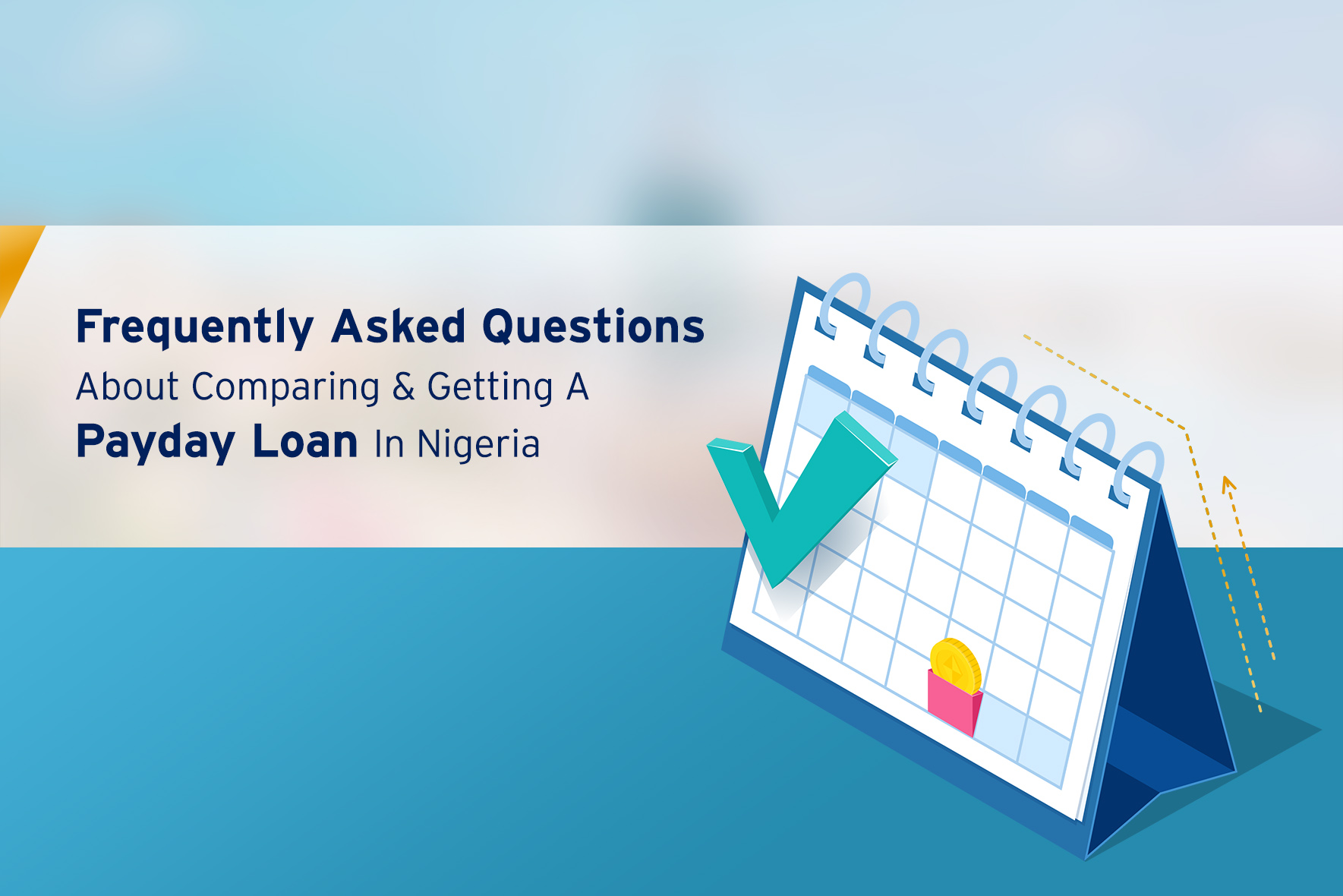
FAQs About Comparing & Getting A Payday Loan in Nigeria
Author Eyitemi Efole
When it comes to comparing and getting a payday loan in Nigeria, there seems to be no end to the questions borrowers tend to ask. With tons of information to sift through, taking the wrong steps might lead a potential borrower into an unsavory loan situation.
The decision to take out a loan comes with obligations and commitment, so it makes sense to thoroughly research your options. nairaCompare has curated multiple loan options to suit each consumer and financial situation. However, in order to get started, there may be a few questions that you need to ask yourself as well as your lender.
Here is a list of questions to ask before getting a loan:
What is a Payday loan?
A payday loan, also called a payday advance, salary loan, or cash advance loan is a short-term unsecured loan. It is often characterized by high-interest rates.
The term ‘payday’ is coined from an earlier time when a borrower writes a postdated cheque to the lender for the payday salary but receives part of that payday sum in immediate cash from the lender.
However, in today’s world, the concept also applies regardless of whether repayment of loans is linked to a borrower’s payday.
By its nature, a payday loan’s principal is typically a portion of the borrower’s next paycheck.
Advantages of a Payday loan
Perhaps the most significant advantage of payday loans is that they are convenient and quick to access. Unlike other traditional lending products, borrowers can apply online in just a few minutes, and money could reach their bank account on the same day.
In addition to this, there are lots of choices for borrowers. Many lenders offer payday loan products, making it even easier to access this form of borrowing.
Also, payday loans come with fewer requirements than other loans.
Many borrowers are attracted to payday loans because the acceptance criteria are often less strict than for other categories of lending.
Borrowers with poor credit histories and lower incomes are often able to get approved by payday lenders despite the fact that they don’t meet the basic eligibility criteria of banks and other high street institutions.
How Payday loans work
Payday loan providers normally require the borrower to show proof of income, usually pay stubs from their employer or via a bank statement. They will then make a loan offer that is commensurate with the income.
Borrowers are usually required to pay the loan back within a short time, generally 30 days or less.
Payday lenders take on a lot of risk because they don’t check your ability to pay back the loan. Because of this, they normally charge very high-interest rates for payday loans, and they may also charge high fees if you miss your repayments.
This can be dangerous for borrowers because it can mean that you’ll need to borrow more money to cover the cost of the first loan.
Frequently Asked Questions (FAQs) about Comparing & Getting Payday loans in Nigeria
1. How Do I Get a Payday Loan?
In the past, payday loans could only be acquired by making a physical appearance at a bank or a small credit merchant’s physical store. Today, however, most payday loan services have been made available through online lenders or via a loan app.
2. What kind of documentation do I need for a Payday Loan?
The basic requirements for a payday loan are a few and can be easily accessed.
To get a payday loan, one needs to provide proof of income, an active bank account, and valid identification. Also, borrowers must be at least 18 years old.
3. How much can I borrow?
Although the loan amount is known to vary for the different platforms, basically salaried borrowers can borrow between ₦ 10,000 and ₦ 5 million, while self-employed customers can borrow between ₦ 10,000 and ₦ 500,000.
4. How long do I have to repay the loan?
Customers in both groups above are expected to make payments within 6 to 12 months.
5. How long will it take to get the money?
Depending on the loan amount and application time frame, the loan can be approved in as few as 15 minutes.
In other circumstances, there may be a waiting period of about 48 hours before you receive funds.
6. Do I need my credit score to take a Payday loan?
Payday loans generally do not require a credit check, so your credit score will not affect whether or not you are approved for the loan.
Also, payday loans can help you improve your credit score if you make your payments on time.
7. What is the interest rate on the loan?
There are no fixed interest rates on payday loans, different financial institutions have their different rates. Be sure to check before applying for the loan.
8. How does the loan repayment work?
Some loan providers reach an agreement with the borrower to make deductions directly from their banks on particular days. Others require the borrower to issue post-dated cheques to be cashed on a particular date.
Either way, it is important to have funds in your account on the due date to avoid being penalised. Failing to meet up with payments may also affect your credit.
9. What is the term of the loan?
By their nature, Payday Loans are short-term. As a result, they typically need to be paid back by the borrower’s next payday after the loan is made. This could be either a one-week, two-week, or one-month period.
10. Are there any fees involved?
Some loan providers are known to charge an administrative fee for first-time borrowers.
11. Does the loan require a cosigner?
Payday loans do not require a cosigner, even though some financial institutions may require that the borrower provides a guarantor.
12. What are the risks of taking a Payday loan?
Because payday loans are typically tied to salaries, many borrowers run into financial trouble when they can’t pay them off at the due date. This could be as a result of delayed salaries or the need to prioritise your need against a loan repayment.
Either way, if you’re feeling pressured to apply for a loan, be sure that the amount you apply for can easily be repaid without adversely affecting your lifestyle.
Also, be wary of the activities of loan sharks. Some of them disguise themselves as legitimate lenders and lure unsuspecting borrowers into a life of debt.
In situations where the fees aren’t spelled out in your contract, or your lender makes promises that seem too good to be true, you may be dealing with a predatory lender.
After reviewing these questions to ask before getting a loan, you may decide a Personal loan is right for you.
Otherwise, it is advisable to seek other means of raising funds. One of the most popular ways of meeting financial needs outside the loan sphere is to borrow from family or friends.
If you’re in a financial bind, a family and friends loan may be a great way to dodge a high-interest payday loan. In fact, you may even be able to borrow money with no interest.
Failure to repay a loan of this type won’t hurt your credit, but it can result in legal action and a severed friendship or strained family relationship.
About Author

Eyitemi Efole
Eyitemi Efole is exploring the marketing field, with a particular interest in brand management, strategy, and operations. She is keen on understanding how brands build trust and connect meaningfully with their audience.









